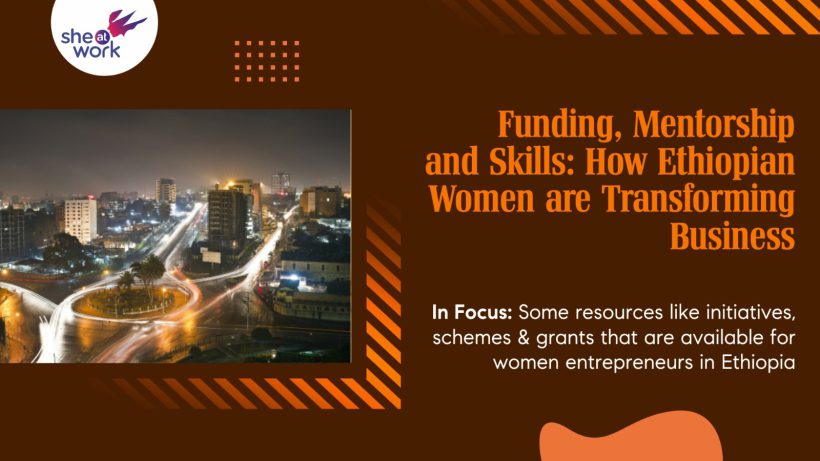In Focus: Some resources like initiatives, schemes & grants that are available for women entrepreneurs in Ethiopia
#WomenEntrepreneurs #EthiopiaBusiness #WomenInTech #StartupSuccess #EconomicEmpowerment
Ethiopia, known as the “Horn of Africa” or the “Land of Sunshine” is home to a growing circle of women entrepreneurs, who are transforming the country’s economic landscape. Despite persistent challenges, including limited access to finance, societal expectations & a male-dominated business environment – Ethiopian women are creating businesses, driving innovation & breaking industry barriers.
Building Bridges: Where Women Entrepreneurs in Ethiopia Can Find Support
To support their success, a range of initiatives, funding programs & training opportunities have emerged. Organizations like – the Women Entrepreneurs Development Project (WEDP) provide microfinance and business development services, while programs such as She Leads Africa, the Ethiopian Women’s Business Association (EWBA), and Digital Opportunity Trust (DOT) Ethiopia – offer mentorship, training, and networking platforms.
Additionally, the Ethiopian government and international partners are investing in women-led businesses, especially in high-potential sectors like agriculture, technology & manufacturing. With enhanced access to digital skills and financial literacy programs, more women are stepping into tech entrepreneurship – a field where female representation remains low. By leveraging these resources, Ethiopian women can strengthen their businesses, build economic independence & drive national progress too. So, the key to success lies in access to funding, mentorship & skill development – ensuring women have the tools they need to thrive.
Now let us look at some resources that are available for women entrepreneurs like initiatives, schemes and grants in Ethiopia.
> National Policy on Women
On a realistic note, the Ethiopian Government’s commitment and dedication to promote women’s equal participation in the economic, political and social developments of the country has been manifested in various forms. A number of measures taken by the government have created an enabling environment – to empower women to become active participants of the development process and benefit from it. In 1992 the creation of a Women’s Affairs Office within the Prime Minister’s Office worked to promote gender equality in areas of development. The declaration of the first National Policy on Women in 1993 provided a framework within which Government’s commitment to empower women could be channeled. The Women’s Affairs Office of the Prime Minister’s Office is thus charged with responsibilities – to oversee & coordinate activities leading to the effective implementation of the Policy.
The Policy clearly states that the responsibility of ensuring the implementation of the National Policy on Women lies mainly with the Government. When the National Policy on Women was declared, the challenge then was the creation of a government structure through which the implementation of the Policy could be materialized. In this connection, the institutionalization of women’s economic, political and social rights within government structure, was not only a necessary step to implement the Policy, but one that would enable the inclusion of women’s needs & concerns into government’s policy and all development plans. The ultimate goal here was – to achieve a level where government policies on economic, political and social spheres and all development intervention plans become gender-sensitive and gender-inclusive.
So, in line with the guiding principles of the National Policy on Women that Women’s Affairs Departments were established with in 13 strategically situated line ministries. Similarly, it was in line with Government’s decentralization process, and in order to ensure the incorporation of gender in the planning and implementation of development programs. Within the regional governments Women’s Affairs Bureau were established in 10 regional governments and in two special administrative regions.
https://www.un.org/womenwatch/daw/country/national/ethiopia.htm
> Digital Gender Ethiopia
International Finance Corporation (IFC) and Women Entrepreneurs Finance Initiative (We-FI) partnered – to bridge the opportunity gap for women in the technology & innovation space in Ethiopia. The program, known as Digital Gender Ethiopia, aimed to increase the pipeline of women digital entrepreneurs in Ethiopia – by providing access to training & business support services.
Through the program, Gebeya, a Pan African education technology and online job placement company, trained 250 women software developers. Gebeya’s training can be differentiated from other players in the market through its blended curriculum – which includes basic and advanced programming skills, as well as real-world job-readiness skills.
Additionally, Gebeya incubates twenty high-potential aspiring start-ups. Each awardee will receive USD 10,000 in seed funding to implement their tech businesses. A follow-up phase of the program will provide participants with mentoring services from successful digital entrepreneurs.
> Impact
The program – Impact works to develop a pipeline of women equipped with tech skills to meet the market’s dynamic needs. Participants will be linked with global tech companies that offer employment opportunities for youth in Ethiopia.
Moreover, the program catalyzes the emergence of female digital entrepreneurs – by providing high-potential program participants with technical, strategic & financial support to set up and scale their businesses.
Overall, this program aims to improve opportunities for women – to participate & thrive in the digital space, which has indeed, become increasingly critical following the COVID-19 pandemic.
https://we-fi.org/project/building-a-pipeline-of-women-entrepreneurs-in-ethiopias-digital-
sector/
> Women Entrepreneurship Development Project (WEDP)
The development objective of Women Entrepreneurship Development Project (WEDP) provides training and credit – to micro and small enterprises owned or partly owned by the participating female entrepreneurs in Addis Ababa, Dire Dawa, Mekele, Bahir Dar, Adama , Hawassa, Assela, Axum, Dilla and Gondar Cities to increase the earnings and employment of the enterprises.
The Women Entrepreneurship Development Project (WEDP) provides finance & business support – for growth-oriented women entrepreneurs in Ethiopia. In fact, WEDP created the first ever women-entrepreneur focused line of credit in Africa in 2013. And, after fully disbursing its IDA commitment in two years, the project was expanded through co-financing from Japan, Italy, Canada, and the European Investment Bank. T A key ingredient in many entrepreneurs’ lives is – the Women Entrepreneurship Development Project (WEDP); and the liquidity facility and training from WEDP proves to be a critical success factor for business expansion. Nearly 24,000+ women across Ethiopia have secured a business loans from the Women Entrepreneurship Development Project. The project has provided business and technical training to 32,000+ women entrepreneurs. And, many have substantially increased their income & created jobs too.
https://www.linkedin.com/company/wedp/?originalSubdomain=et
> The European Investment Bank (EIB)
The European Investment Bank (EIB), is involved with the Ethiopian Ministry of Finance and Economic Cooperation – to boost female economic inclusion & empowerment across the country.
And after signing it was confirmed that the EIB will provide a €30 million long term loan to the Ethiopia Women Entrepreneurship Development Project (WEDP) also funded by the World Bank (WB), which supports micro & small enterprises owned or partly owned by women entrepreneurs.
Accordingly, this was made to address a major obstacle – especially for women encountering a lack of access to finance for their firms. Realistically, they are often excluded by commercial banks due to the relatively small loan size they need and the excessive collateral requirements.
> Enat Bank
Enat Bank was created by a group of Ethiopia’s leading businesswomen. It was founded with the mission of – empowering women through finance by supporting female entrepreneurs.
In Ethiopia, women own the majority of micro and small enterprises, but the number of successful women entrepreneurs is much lower than the number of men! The reasons are due to challenges that women primarily face including – limited access to finances, lack of knowledge on feasible business development, poor management and their need to shoulder household & family responsibilities.
Recognizing the role women play in stimulating social and economic development and the reduction of poverty, in 2014 the bank established a separate financial unit for women. The unit is tasked with facilitating financial access and providing financial education for women – focusing on the importance of saving and the basics of business management.
The first step taken by the new unit was – developing the Enat Collateral Saving Account which provides loans to assist women to grow or start new businesses. The account is available for individuals or organizations – to deposit specific amounts of money that are blocked for a period of time, during which the bank uses the money as a guarantee for women entrepreneurs. Plus, the bank provides these loans without requiring collateral; thus addressing a major problem that has traditionally prevented women entrepreneurs from receiving bank loans.
https://unglobalcompact.org/take-action/action/case-example/119
> New UNIDO Project Supports Employment and Entrepreneurship for Ethiopia’s Women and Youth
The UN Industrial Development Organization (UNIDO) launched the Youth and Women Entrepreneurship Promotion (YoWEP) project in Addis Ababa. The YoWEP project seeks to support the Ethiopian government’s efforts – to tackle the challenges of unemployment among youth & women, as well as the corresponding rise of economically driven migration.
Partners to the project believe support for enterprises run by young people and women in the strategic industrial sectors, such as agro-food processing, leather products & textiles, will lead to employment opportunities in the country.
This project was launched to reinforce the organization’s commitment to supporting the potential of youth and women entrepreneurs. And, it comes against the backdrop of increased efforts to invest in initiatives tackling unemployment and migration among young people and women in Ethiopia.
The project – supported by Ethiopia’s Ministry of Industry, the Italian Agency for Development Cooperation and the Austrian Development Cooperation – focuses to find integrated strategies that can have a significant positive impact on the social & economic participation of youth and women.
> Micro and Small Enterprise Development Strategy
The Micro and Small Enterprise (MSE) development strategy The Ethiopian government released the country’s first Micro and Small Enterprise Development Strategy in November 1997. The primary objective of the national strategy framework is – to create an enabling environment for small and micro-enterprises.
The specific objectives are to:
- Facilitate economic growth and bring about equitable development;
- Create long-term jobs;
- Strengthen cooperation between MSEs (to jointly address hindering obstacles, take up opportunities and build collective efficiency);
- Provide the basis for medium and large scale enterprises;
- Promote exports (especially in leather, textiles, and horticulture, where Ethiopia has comparative advantages);
- Balance preferential treatment between MSEs and larger enterprises. Since then, the Government has taken a number of actions to change the regulatory environment for MSEs, simplify the business registration and licensing process, revise the Investment
Law, create new MSE agencies, and establish a legal framework for private sector development. The Government’s recent Industrial Development Strategy identifies MSEs as a key priority.
The Ministry of Trade and Industry was given responsibility as the organ of the Federal Government for the formulation of policies & strategies – to promote the expansion of enterprises and to facilitate the provision of assistance to MSEs
https://www.afdb.org/fileadmin/uploads/afdb/Documents/Policy-Documents/GOWE%20Ethiopia.pdf
> Financing Guide for Women Entrepreneurs
“Financing Guide for Women Entrepreneurs” is published for the purpose of creating more awareness of credit and access options among women-owned MSEs. This was produced in cooperation with women’s entrepreneur associations, throughout the country and distributed through seminars with women’s groups.
Such a guide helps to create greater awareness among women entrepreneurs & associations of women entrepreneurs – about standard banking practices, and help women entrepreneurs when it comes to preparing business plans and feasibility studies.
https://www.afdb.org/fileadmin/uploads/afdb/Documents/Policy-
Documents/GOWE%20Ethiopia.pdf
> Enterprise Ethiopia (EE)
Established in 1999, the Enterprise Ethiopia (EE) promotes the entrepreneurial capacity of MSEs through the provision of training, post-training seminars and business development services. It is a joint initiative of the Ethiopian Government, UNDP, UNCTAD and the Enterprise Africa Regional Office.
EE received its start-up funding through a US$2 million donor contribution to the Ethiopian government; and one of the donor requirements was that 40 per cent of their training be delivered to women. However, there are indications that they have difficulty in attracting women to their programs. One reason may be the cost. During 2003, they offered two training sessions specifically for women and were able to fill the seats but, had to waive the training fees!!
EE officials feel that women-owned MSEs need more counselling and training, more exposure to business opportunity information (“so women don’t just start a business like the one their neighbour has”), and financial management skills (eg costing, pricing, and cash-flow management).
https://www.afdb.org/fileadmin/uploads/afdb/Documents/Policy-
Documents/GOWE%20Ethiopia.pdf
> Amhara Women Entrepreneurs’ Association (AWEA)
Amhara Women Entrepreneurs’ Association (AWEA) offers training – to prepare women for participation in trade fairs (eg product quality, packaging and presentation, signage, brochures and business cards, etc.) and post-trade fair debriefing sessions to reflect on lessons learned.
However, there are drawbacks such as – the lack of training, market opportunity information, self-confidence (need to be empowered to have “larger visions” for their enterprise activity), and role modeling as the major barriers to growth of their members.
https://www.afdb.org/fileadmin/uploads/afdb/Documents/Policy-
Documents/GOWE%20Ethiopia.pdf
> Ethiopian Women Exporters’ Forum (EWEF)
It was in January 2000, that EWEF was established, and the forum is an innovative approach in forging a strong bond among women engaged in export trade. As of December 2003, there were 22 members, all exporters registered in the MoTI database.
The Ethiopian Women Exporters’ Forum (EWEF) was started by a group of women exporters who wanted to become more organized as a force in the Ethiopian economy. As exporters, these women play a significant role – in the business community both as employers and as role models. Their exports include a diversity of products – including coffee, spices, cereals, oil seeds, textiles, handicrafts, flowers, agricultural products, and leather.
With regard to growth, officials from the Forum focus on the importance of leadership training. But the Forum is not without challenges. Forum officials depend on their own volunteer time and resources to run the affairs of the Forum, and they lack capacity to expand membership and services. External financial support is also required – to build their membership nationally and to fully implement their mandate. Their forward plan is to expose more women to international information, markets, marketing courses, and the ‘how-to’ of doing international business.
https://www.afdb.org/fileadmin/uploads/afdb/Documents/Policy-
Documents/GOWE%20Ethiopia.pdf
> Academy for Women Entrepreneurs (AWE)
A global initiative, Academy for Women Entrepreneurs (AWE) provides resources – to support the social and economic empowerment of women including the skills, networks & opportunities needed to compete in the Ethiopian and global economy. Eligible applicants include – not-for-profit organizations (such as think tanks and civil society/non-governmental organizations), public and private educational institutions, and public international organizations and governmental institutions.
ECA launched AWE in 2019 – to help women develop the skills and networks needed to start and grow businesses. Participants learn skills like – strategic planning, marketing, and finance through online and in-person sessions, with guidance from business leaders and US exchange alumni mentors.










